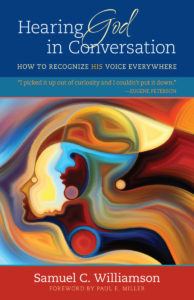I was ten years old the first time I heard God speak. It was autumn, a new school year had just begun, and a new fad was spreading among my adolescent classmates.
Cussing.
I was raised in a conservative Christian church where Sunday school teachers taught us the Ten Commandments. The teachers were vague about adultery, and I wasn’t concerned. They were also unclear about coveting, and I felt safe.
They made up for their ambiguity when it came to cussing. Instead of an elusive “Don’t take the name of the Lord in vain,” they precisely taught, “Don’t swear.” And when they said, “Don’t swear,” they meant, “Don’t cuss.”
For us, cussing was a sin on the order of mass genocide.
One day while playing school-yard tag, I tagged my girlfriend, Diane, and she shouted, “Shit!” I felt a shockwave race through my body, as though I’d been hit in the gut with a sledgehammer. Forty-five years later, I still feel that visceral punch, and I can exactly picture the playground gate where Diane cussed. I gasped for air but nothing came.
Looking back, it seems silly that a cuss word could cause such a shock, but it did. I expected God to cast down a lightning bolt and burn Diane to ash. The thought almost paralyzed me.
But not quite. I leaped back seven feet in case the bolt went wide.
But Nothing Happened
And then . . . nothing happened. No lightning bolt. Not even a firefly. I felt as shocked by the absence of righteous retribution as I had been by the cuss. Maybe more.
My juvenile understanding of Christianity was simple: God blesses good people and he punishes bad people. In my unsophisticated ten-year-old mind, blessing meant being cool and punishment meant being uncool. But that’s not what happened. Instead, the foul-mouthed kids became cooler while the clean-speaking kids grew uncool.
The wicked flourished while the righteous were trampled.
I decided that God could not exist. Oh, it took a week or so of watching the wicked prosper, but there was no doubt in my mind. God didn’t exist. It was all a cruel hoax.
The next day I unleashed the filthiest mouth in the city of Detroit on my classmates. I said things even the wicked feared to say. (They still harbored some fear of God, but I knew better.) The “sh” word was cussing for kids; I dropped f-bombs like hardwood forests drop autumn leaves—and I didn’t even know what the f-word meant.
I was a poet in profanity.
Then, at the end of that day, alone in my bedroom, God spoke to me with a fierce, undeniable, and certain clarity. But all he said was, “Sam, I am real, and you don’t understand.”
Knowing God
God wants us to know him personally—he wants a personal relationship. But we mostly want to know direction: “Should I take this job or that job?” We want information; God wants a conversation. We want to know answers; God wants us to know him.
When God spoke to me, I was deeply moved, but not by his answer to my question, why do the wicked flourish? God never even hinted at an answer. I was moved because I had heard his voice. I had begun to know the person of God, not just facts; I had met him.
God always gives us what we most need, but he doesn’t always give us what we think we most need. Our deepest need is to know God. More than answers, inspiration, information, or guidance, we simply need to know God. That’s why Paul prayed,
“I keep asking that the God of our Lord Jesus Christ . . . may give you the Spirit of wisdom and revelation, so that you may know him better” (Eph. 1:16–17).
Knowing about God just isn’t enough. We need to hear God from his own lips.
Forty-five years ago, my girlfriend cussed, God spoke in the absence of lightening, and it changed my life.
Sam
P. S. This article is an excerpt from my new book, Hearing God in Conversation: How to Recognize His Voice Everywhere.
God wants us to hear his voice; he wants a conversational  relationship with us all. Please consider buying Hearing God in Conversation.
relationship with us all. Please consider buying Hearing God in Conversation.
It’s written for both believers and non-believers (just look at me when I was ten!). Give one to a friend.



Wow this is interesting